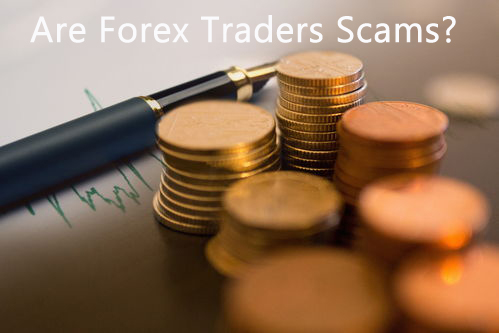The world of Forex trading is one that has gained both popularity and notoriety over the years. While many individuals have found success in the Forex market, there has also been a fair share of skepticism and concerns regarding the legitimacy of Forex traders. This article aims to address the question: Are Forex traders scams?
Understanding Forex Trading
Before delving into whether Forex traders are scams, it's essential to understand what Forex trading is. Forex, short for foreign exchange, is the global marketplace for buying and selling currencies. It operates 24 hours a day, five days a week, and it's the largest financial market in the world.

The Forex Market and Its Participants
The Forex market is primarily composed of various participants, including:
Retail Traders: These are individual traders like you and me who participate in the Forex market through online brokers.
Institutional Traders: Banks, financial institutions, and corporations engage in Forex trading to manage their currency exposure.
Brokers: Forex brokers act as intermediaries between retail traders and the interbank Forex market. They provide trading platforms and access to the market.
Market Makers: Some brokers also serve as market makers, meaning they take the opposite side of their clients' trades. This can sometimes lead to conflicts of interest.

Forex Trading Scams
While the Forex market itself is legitimate, there have been instances of scams and fraudulent activities in the industry. It's crucial to distinguish between legitimate Forex trading and Forex trading scams. Here are some common types of Forex trading scams:
Unregulated Brokers: Some brokers operate without proper regulatory oversight. Investing with an unregulated broker can put your funds at risk.
Ponzi Schemes: Scammers may lure unsuspecting investors with promises of high returns, but they use new investors' money to pay earlier investors, creating a Ponzi scheme that eventually collapses.
Signal Services: Be cautious of signal services that claim to provide foolproof trading signals for a fee. Many of these services are unverified and can lead to losses.
Fake Investment Funds: Scammers may create fake investment funds that promise high returns. They often disappear with investors' money.
Phishing and Identity Theft: Cybercriminals may impersonate legitimate brokers or platforms to steal personal and financial information.
Avoiding Forex Trading Scams
To protect yourself from Forex trading scams, consider the following precautions:
Choose Regulated Brokers: Trade with brokers that are regulated by reputable authorities such as the CFTC (Commodity Futures Trading Commission) in the United States or the FCA (Financial Conduct Authority) in the United Kingdom.
Do Your Research: Investigate the broker or service provider thoroughly. Check for reviews, regulatory compliance, and any red flags.
Beware of High Guarantees: Be skeptical of services that promise guaranteed profits with no risk. All trading involves risk, and there are no guarantees.
Protect Your Personal Information: Keep your personal and financial information secure. Be cautious of unsolicited emails or phone calls requesting sensitive information.
Educate Yourself: Gain a solid understanding of Forex trading principles, strategies, and risk management before you start trading.
In conclusion, the Forex market itself is not a scam, but there are scams and fraudulent activities within the industry. It's essential to exercise caution, conduct due diligence, and choose reputable brokers when participating in Forex trading.
For a secure and reliable Forex trading experience, consider JRFX ( https://www.jrfx.com/?804 ) – a trusted financial brokerage with a reputation for safety and transparency. JRFX offers a range of features to protect your investments and ensure a trustworthy trading environment.
Understanding Forex Trading
Before delving into whether Forex traders are scams, it's essential to understand what Forex trading is. Forex, short for foreign exchange, is the global marketplace for buying and selling currencies. It operates 24 hours a day, five days a week, and it's the largest financial market in the world.

The Forex Market and Its Participants
The Forex market is primarily composed of various participants, including:
Retail Traders: These are individual traders like you and me who participate in the Forex market through online brokers.
Institutional Traders: Banks, financial institutions, and corporations engage in Forex trading to manage their currency exposure.
Brokers: Forex brokers act as intermediaries between retail traders and the interbank Forex market. They provide trading platforms and access to the market.
Market Makers: Some brokers also serve as market makers, meaning they take the opposite side of their clients' trades. This can sometimes lead to conflicts of interest.

Forex Trading Scams
While the Forex market itself is legitimate, there have been instances of scams and fraudulent activities in the industry. It's crucial to distinguish between legitimate Forex trading and Forex trading scams. Here are some common types of Forex trading scams:
Unregulated Brokers: Some brokers operate without proper regulatory oversight. Investing with an unregulated broker can put your funds at risk.
Ponzi Schemes: Scammers may lure unsuspecting investors with promises of high returns, but they use new investors' money to pay earlier investors, creating a Ponzi scheme that eventually collapses.
Signal Services: Be cautious of signal services that claim to provide foolproof trading signals for a fee. Many of these services are unverified and can lead to losses.
Fake Investment Funds: Scammers may create fake investment funds that promise high returns. They often disappear with investors' money.
Phishing and Identity Theft: Cybercriminals may impersonate legitimate brokers or platforms to steal personal and financial information.
Avoiding Forex Trading Scams
To protect yourself from Forex trading scams, consider the following precautions:
Choose Regulated Brokers: Trade with brokers that are regulated by reputable authorities such as the CFTC (Commodity Futures Trading Commission) in the United States or the FCA (Financial Conduct Authority) in the United Kingdom.
Do Your Research: Investigate the broker or service provider thoroughly. Check for reviews, regulatory compliance, and any red flags.
Beware of High Guarantees: Be skeptical of services that promise guaranteed profits with no risk. All trading involves risk, and there are no guarantees.
Protect Your Personal Information: Keep your personal and financial information secure. Be cautious of unsolicited emails or phone calls requesting sensitive information.
Educate Yourself: Gain a solid understanding of Forex trading principles, strategies, and risk management before you start trading.
In conclusion, the Forex market itself is not a scam, but there are scams and fraudulent activities within the industry. It's essential to exercise caution, conduct due diligence, and choose reputable brokers when participating in Forex trading.
For a secure and reliable Forex trading experience, consider JRFX ( https://www.jrfx.com/?804 ) – a trusted financial brokerage with a reputation for safety and transparency. JRFX offers a range of features to protect your investments and ensure a trustworthy trading environment.